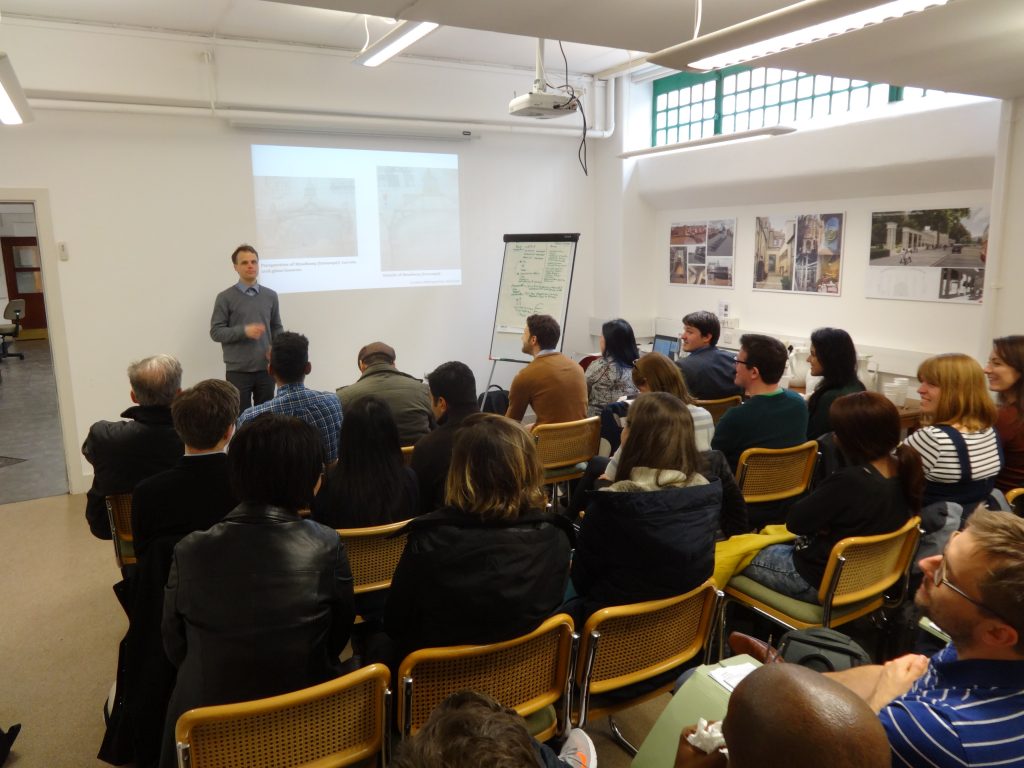Dr. Henrik Schoenefeldt was awarded this year’s Faculty of Humanities Annual Teaching Prize. The prize acknowledges three major initiatives that Henrik has taken over the past five years to address a series of important challenges in contemporary architectural education and practice. The focus of his initiatives was on introducing students to (1) new practices of sustainable design, (2) establishing a research culture within the largely design-led education of architecture and (3) improving the pedagogical knowledge and skills of architects through a new module in architectural education.
The panel wrote that the three initiatives ‘taken individually and collectively, are outstanding and this is supported by ample evidence from a range of external academic and professional sources’. It noted that they successfully engaged with the challenge of introducing ‘new practices of sustainable environmental design into architectural education’ and demonstrated the ‘pedagogical potential of involving students in collaborative research.’
The 1st Initiative was the development of new approaches to embedding practices of sustainable design within the teaching of architectural design. This was underpinned by a research project funded through a grant from the Higher Education Academy. The objective of the research project, entitled Inquiries into a new model of teaching environmental design in architecture, was to gain a critical understanding of how environmental sustainability and climate change requires students and architects to adopt new forms of practice. The findings of this research informed the development of a new studio model that introduces students to practices of ‘comprehensive design’ as well as two modules in sustainable design and technology for the MArch programme. In the first module, AR546 Sustainable Technology in the Context of Architecture, students undertake critical case studies, reviewing how modern practitioners integrate research into the design process to develop sustainable technological solutions. To gain such insights students undertake primary research, including interviews with practitioners, clients and building users. In the second module AR647-Design-led Research in Architecture, students are required to develop their own approaches to design-led research within their final architectural project, recording and critically reviewing their design methodologies through diaries and reflective essays.
The objective of this initiative was to establish a research culture within the largely design-centred curriculum of architecture, providing an educational environment where students experience design and research as complementary rather than conflicting cultures of learning.
The second initiative, which focused on exploring the pedagogical potential of involving students in collaborate research, followed a similar objective. It was collaborative research project, which was entitled Interrogating the technical, economic and cultural challenges of delivering the PassivHaus standard in the UK and took place between June 2013 and July 2014. The objectives of the project were to (1) bridge the gap between academic research, industry and university-based teaching, (2) enable students to develop an expertise in sustainable design and to (3) involve students directly in original academic research, including the process of dissemination through conferences and peer-reviewed publications. The project brought together practitioners, academics and final years students from the MA and BA programmes with the aim to investigate how the UK’s building industry can achieve buildings complying with the stringent energy efficiency requirements of the German PassivHaus standard. Acting as an alternative to the traditional dissertation, students joined a research team working on a larger research project. It involving case studies of fifteen real-life projects in England and Wales. Through interviews with the architects, contractors, consultants, suppliers and developers the students were able to engage directly with the different professions involved. This offered intimate insights into the challenges of low energy design not only from the view of the architectural profession, but also from a cross-industry perspective. The project culminated in the production of a peer-reviewed eBook and a conference, which was organised in collaboration with Kent Innovation and Enterprise.
The 3rd initiative was the development of a module in architectural education (AR600 Architectural Pedagogy), which provides students in the final year of the MArch programme with formal training in architectural education, covering theory and teaching practice. The module has been running for the second time this year, following a successful first year in 2014-15. KSA is currently the only school of architecture in the UK that offers a taught module in architectural education, combining a formal program of lectures, tutorials and seminars with research projects and teaching practice. Henrik has written an article about his experience with this module in this year’s End of Year Catalogue; click here to view the article.
The panel emphasised that ‘evidence on external impact was considerably strong’. Henrik had received numerous invitations to speak about his work in architectural education. This included the annual symposium of the Standing Conference of Heads of Schools of Architecture, held at the Royal Institute of British Architects in April 2015, which also got reported in the Architect’s Journal (15 April 2015).

